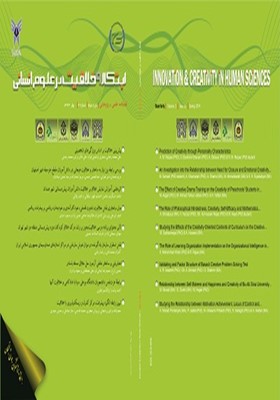مدل ساختاری نقش خلاقیت، ذهنیت فلسفی، خودکارآمدی و خودپنداره ریاضی بر پیشرفت ریاضی
محورهای موضوعی : خلاقیت و نوآوری از جنبه‏های روان‏شناختی، علوم شناختی، علوم تربیتی و آموزشی (خلاقیت شناسی روان‏شناختی، خلاقیت شناسی پرورشی)اصغر شیرعلی پور 1 , ولی اله فرزاد 2 , غلامرضا حاجی حسین نژاد 3 , مسعود اسدی 4 *
1 - کارشناس ارشد تحقیقات آموزشی دانشگاه خوارزمی asgarshiralipoor@gmail.com
2 - عضو هیئت علمی، دانشگاه خوارزمی vfarzad@yahoo.com
3 - عضو هیئت علمی، دانشگاه خوارزمی hosseinnejad-1@yahoo.com
4 - دانشجوی دکترای مشاوره، دانشگاه خوارزمی (نویسنده مسئول) masoudasadi_fc@yahoo.com
کلید واژه: خلاقیت, ذهنیت فلسفی, پیشرفت ریاضی, خودکارآمدی ریاضی, خودپنداره ریاضی,
چکیده مقاله :
زمینه: ریاضی ازجمله دروس اصلی و تأثیرگذار در عملکرد تحصیلی و آینده شغلی افراد است و عوامل متعددی مانند خلاقیت، ذهنیت فلسفی، خودکارآمدی ریاضی و خودپنداره ریاضی در آن نقش دارند. هدف: پژوهش حاضر با هدف بررسی نقش خلاقیت، ذهنیت فلسفی، خودکارآمدی ریاضی و خودپنداره ریاضی بر پیشرفت ریاضی دانش آموزان سوم تجربی انجام شد. روش: روش پژوهش همبستگی و جامعه آماری پژوهش حاضر کلیة دانش آموزان سال سوم متوسطه شهرستان مرندبود برای انجام مطالعه تعداد 393 دانشآموز (136 پسر و 257 دختر) به روش نمونهگیری خوشه ای چندمرحلهای انتخاب شدند. ابزار پژوهش پرسشنامة ذهنیت فلسفی، خود کارآمدی ریاضی، خلاقیت و خودپنداره ریاضی بود. داده ها با استفاده از تحلیل مسیر و اندازه اثر تحلیل شد. یافته ها:نتایج برازش مدل نشان داد که تمامی اثرات مستقیم خودکارآمدی ریاضی بر متغیرهای خلاقیت، خودپنداره ریاضی و پیشرفت ریاضی مثبت و معنادار است و اثر غیرمستقیم متغیر خودکارآمدی ریاضی بر پیشرفت ریاضی تائید شد. همچنین تأثیر مستقیم متغیر خودپنداره ریاضی بر متغیر پیشرفت ریاضی حمایت لازم را دریافت کرد. در این مطالعه علیرغم اینکه اثر مستقیم خلاقیت بر خودپنداره ریاضی مثبت و معنادار شد، تأثیر مستقیم و منفی این متغیر بر پیشرفت ریاضی بیانگر این مهم است که خلاقیت یک متغیر بازدارنده محسوب می شود. علاوه بر این نتایج تحقیق نشان داد که ذهنیت فلسفی یکی از عوامل تأثیرگذار بر خلاقیت است، ولی اثر مستقیم این متغیر بر پیشرفت ریاضی حمایت لازم را دریافت نکرد نتیجهگیری: از این اطلاعات می توان در راستای بهبود عملکرد ریاضی دانش آموزان استفاده کرد.
Background: Mathematics is among the main subjects affecting academic performance and career prospects of several factors such as creativity, philosophical- mindedness, mathematics self-efficacy in mathematics. Objectives: The aim of this study was to investigate the role of philosophical- mindedness, creativity, self-efficacy and mathematics self-concept on mathematics achievement. Methods: Method study was correlation and the statistical community was all student from Marand county. The sample group included 393) 257 girls, 136 boys) student that were selected by multi-stage cluster sampling. Assessment instruments was of philosophical l- Mindedness, creativity, self-efficacy and mathematics self-concept questionnaire. Data were analyzed using path analysis and effect size. Results: Results show that the direct effect of mathematics self-efficacy on creativity, mathematics self-concept and mathematics achievement was positive and significant and indirect effect mathematics self-efficacy on mathematics achievement was significant. in addition direct effect of mathematics self-concept on mathematics achievement was significant. In this study, although the direct effect of creativity on math self-concept was positive and significant, and the negative impact of these variables indicate the progress of the mathematical creativity is a deterrent variable. In addition, the results of the research showed that the philosophical- Mindedness is one of the factors that influence on creativity, but a direct effect of this variable on the mathematics achievement was not significant. Conclusion: This information can be used in order to improvement student mathematics performance.

